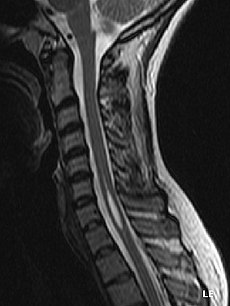 |
| Syringomyelia. See the thin light grey shape inside the spinal cord, placed at centre in the bottom half of the above image. |
We all hear the stories about people who willed away their paralysis. I don't want to say these stories are untrue or that these people are frauds, but often there is a very clear medical reason why some people recover from an injured spinal cord and the vast majority don't. It has a lot less to do with willpower than with what type of injury the person suffered, but because most regular folks aren't experts in spinal cord injury they think that willpower must be one answer.
I think that this thinking also spills over into how people view a successful adjustment to a life with paralysis. People that don't have just enough willpower to cure themselves, but have enough willpower to lead a happy life in the chair. Again, because the media hypes the stories about paralyzed people's success stories, those that aren't so successful end up being thought of as weak.
I guess this comes from people's basic understanding of paralysis, especially paraplegia (just the legs paralyzed). People tend to think of it as an injury that just knocks out your legs and therefore with a strong upper body (and willpower) it should be easy to get used to and lead a normal life. Again, if you can't, it's because of a lack of willpower.
People never think about, because it's never talked about, things like severe neuropathic pain, or pressure sores, or the hundreds of other secondary issues involved with paralysis. In the case of paraplegia, people tend to think that it's just the legs that don't work.
I've got a a new one that people have never thought of. Syringomyelia and I've got it. Basically this is when the spinal fluid enters the spinal cord and causes like a balloon filled with spinal fluid to grow inside the cord which eventually destroys the spinal cord. It often gets longer and goes up the spinal cord leading to sensory dysfunction, pain, weakness, and could lead to quadrapalegia as it gets longer and knocks out the arms.
How did I get this? Lack of willpower? Lack of adjustment to a life of paralysis? No, none of these things matter as you can't will it away or use your willpower to adjust.
No one knows the exact reason why or how it forms, but it forms due to a reaction to a spinal cord injury or hemmorage (which is what I had).
So please keep in mind when you read stories about those leading very successful lives despite their chairs, that not all injuries are the same and not all people suffer secondary complications from their injuries (even though most do and only a small minority lead the lives that you read about in the newspaper).
As of 26 October I'll be writing this blog from the hospital and I get ready for my operation on the 28th and then get moved to a rehab hospital. I'll be letting the surgeon use his skill to get rid of the syringomyelia and then use my skill to keep fighting for a cure for paralysis so things like syringomyelia and all the other complications of spinal cord injury get put into the history books.
Of course you need willpower to not give up hope, but I'm sorry to report, willpower doesn't cure paralysis..
Speedy recovery my friend!
ReplyDeleteBarb
If love could cure you, there would be an abundance flowing your way. Thank you for sharing your blog Dennis. I wish the world could read it too. Love you forever...Ann
ReplyDeleteBest wishes for the surgery Dennis, and for a speedy recovery. - Barbara
ReplyDeleteSpeedy recovery and hoping the outcome of surgery will help your secondary issues.
ReplyDeleteYou rock, Dennis! Best wishes for an uneventful surgery and quick as can be recovery!
ReplyDeleteI'm praying for a speedy recovery! We need you Dennis. Thanks for all your hard work. Take time to care for yourself now.
ReplyDeleteOur thoughts and prayers are with you!!
ReplyDeleteDid the Syringomyelia cause your paralysis or was it a previous injury? I am trying to learn all I can about syrnix as I just found out my daughter has one.
ReplyDeleteI had a hemmorage which caused the paralysis and the syringomyelia (and my arachnoid cyst) are reactions to that.
ReplyDeleteDennis. Please email me and we can talk some more.
stemcells.and.atombombs@gmail.com
Prayers of healing are sending your way. My son has a syrinx. Anyone who wants to correspond please email me at littleredhen@mitchelltelecom.net
ReplyDeletepienso que eres muy pesimista, en el mundo hay mucha gente con sirimgomielia y chiari como es el caso de mi niño de 11 años, lleva 3 años luchando con ella, cuando se la diagnosticaron, pero es mas mi padre no tenia sirimgomelia y estuvo desde los 24 en una silla de ruedas, y yo si fui feliz en mi niñez al lado de el, como lo es mi hijo a mi lado. Y tengas la enfermedad que tengas la fuerza de voluntad es lo que te hace vivir, hay gente que no tiene nada de nada pero es tan aprensiva que cree morirse dia a dia, hay otros que por muy grave que sea su enfermedad viven y ademas hacen felices a los de su alrededor
ReplyDeleteEven I suffer from Syringomyelia...
ReplyDeleteThings r so harder now....I sometimes feel I might never recover......except if Allah helps me!! =( I understand ur condition